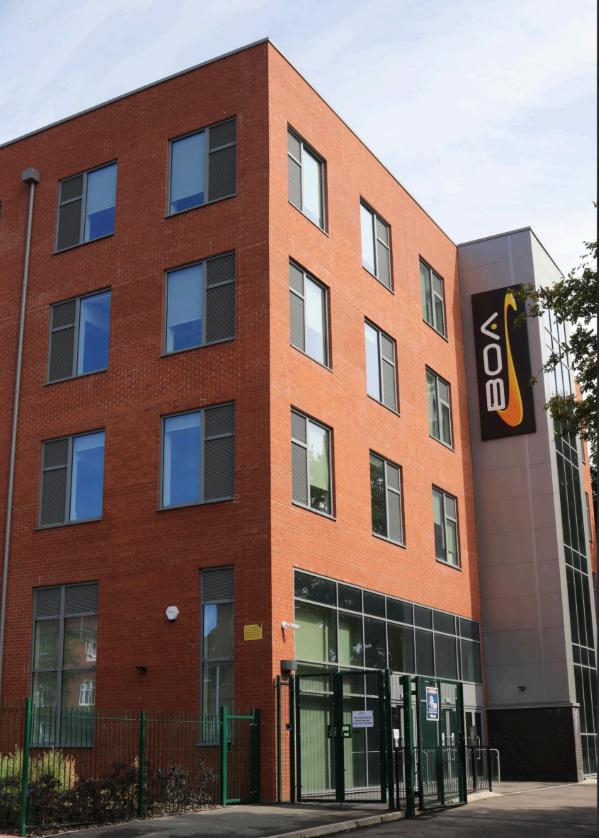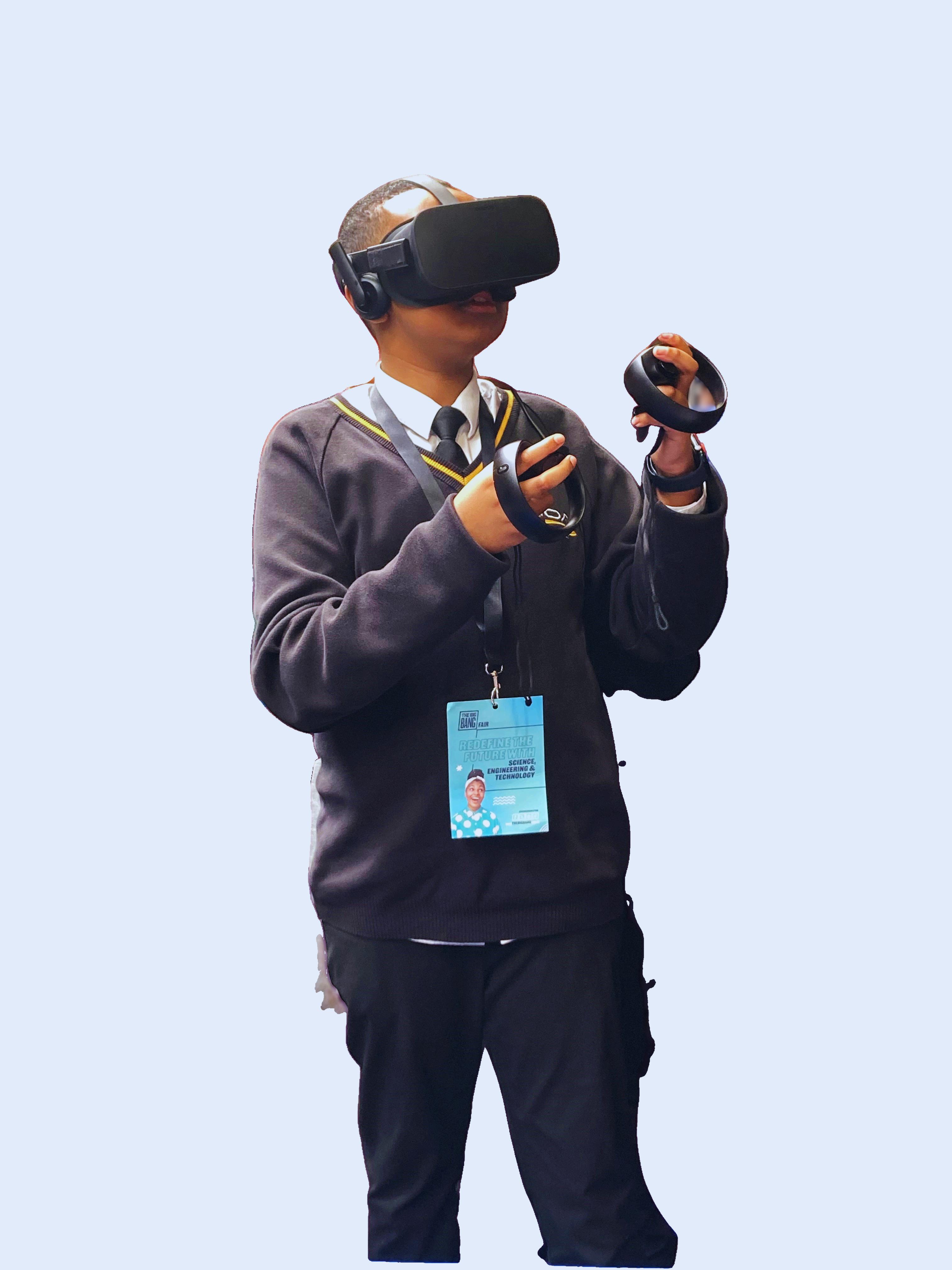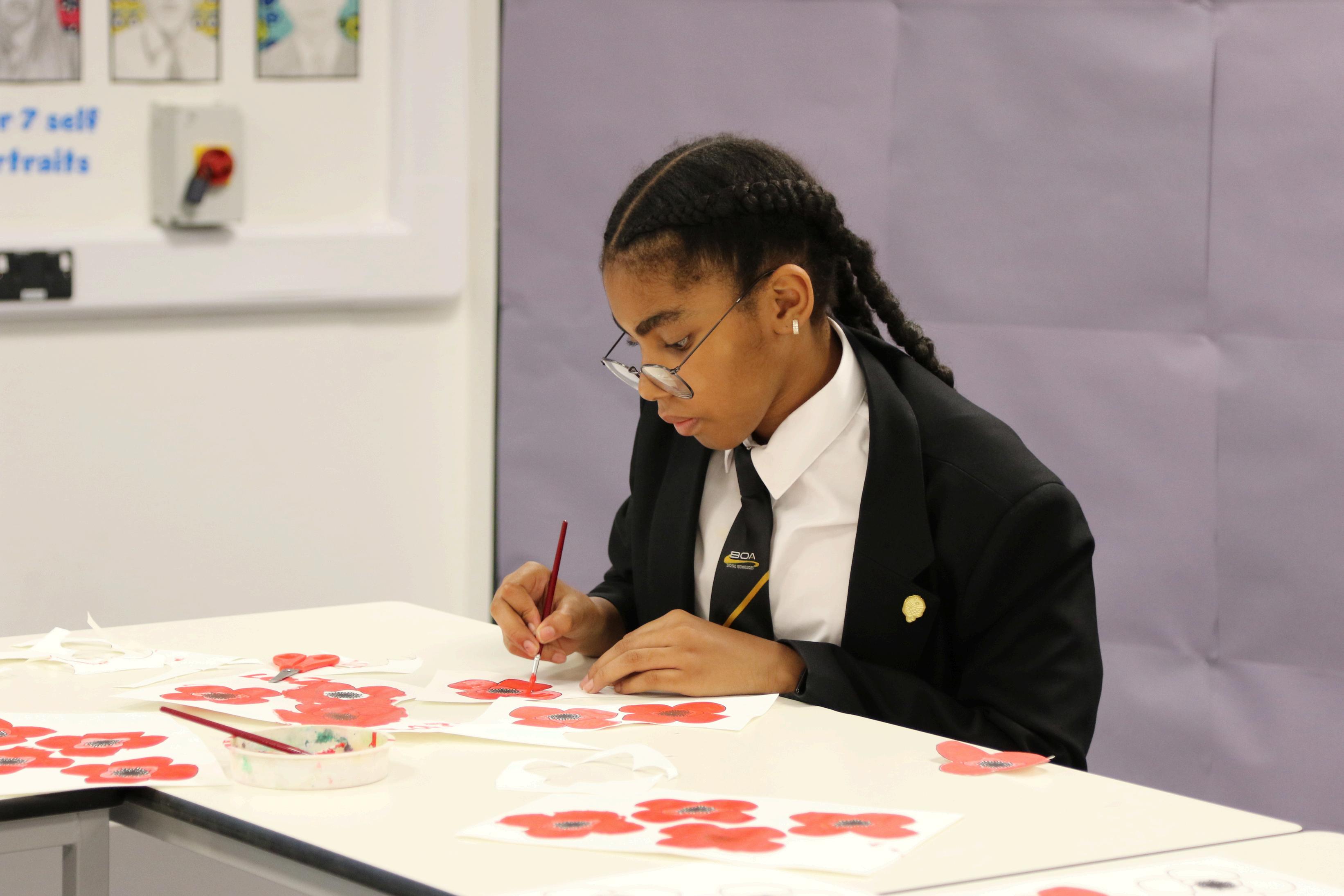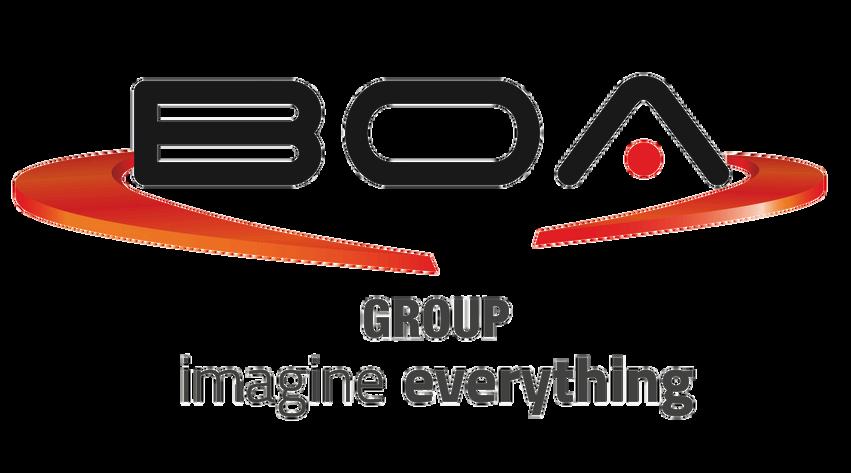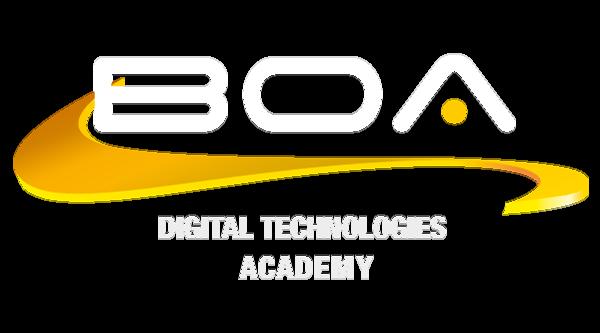
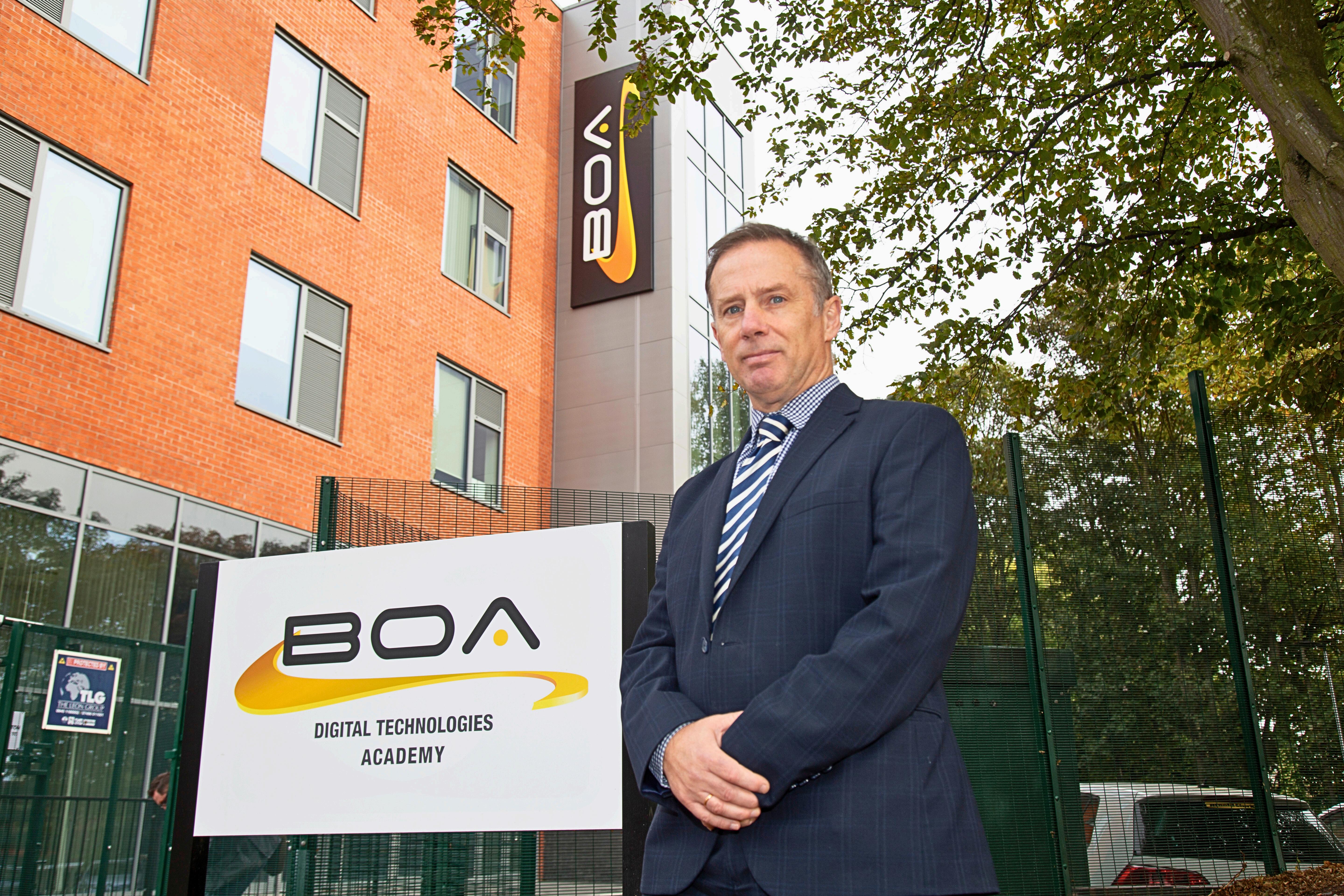
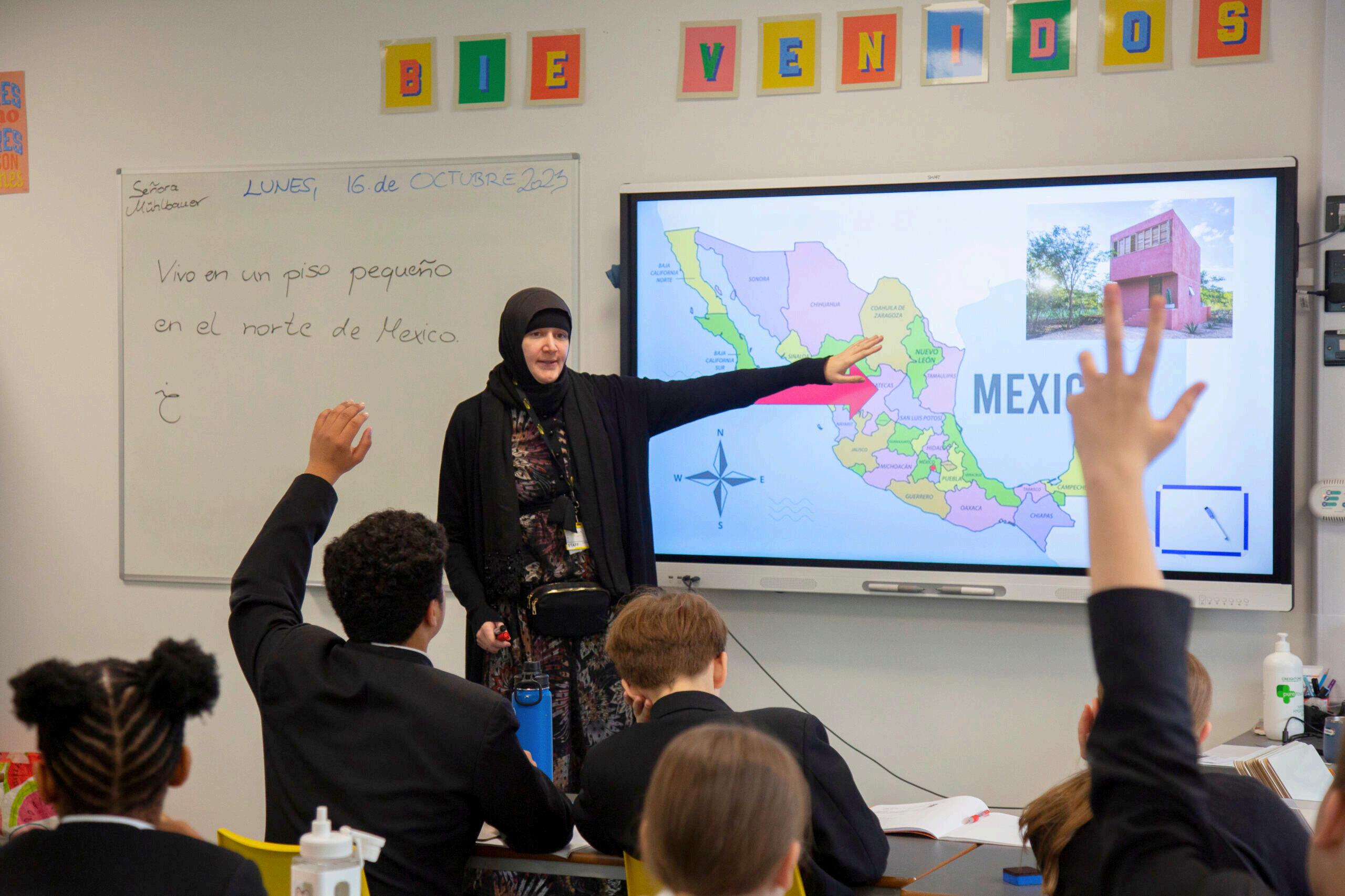
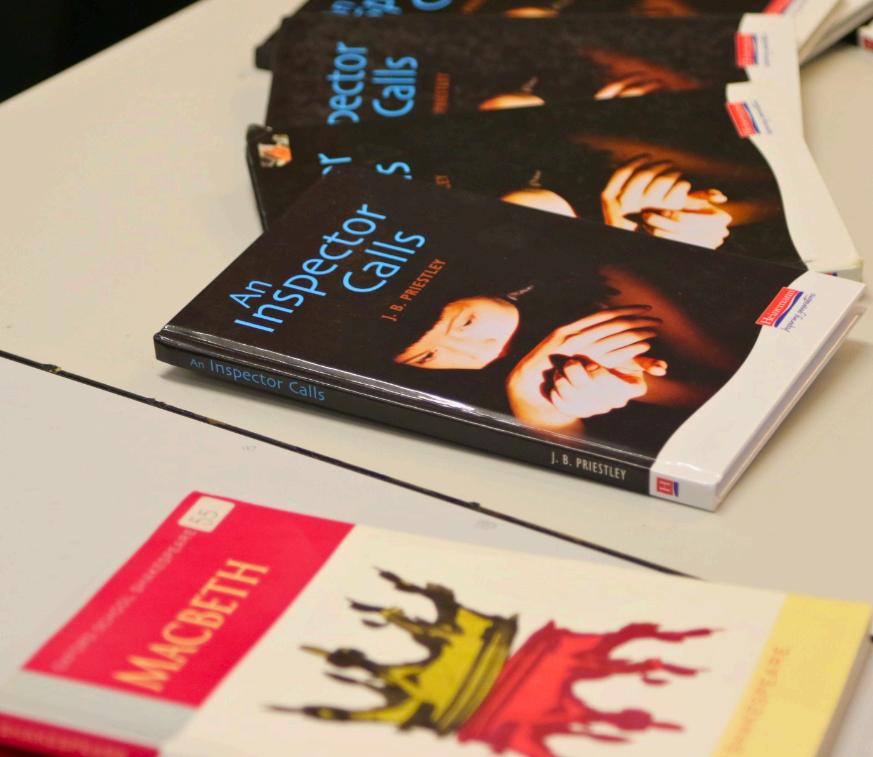





At BOA Digital Technologies Academy, we provide a diverse selection of subjects whilst maintaining our digital specialism. Selecting the right subjects can feel overwhelming, but tutors, subject teachers and Senior Leaders are on hand to guide both students and parents through the decision-making process. The subjects your child chooses will not only prepare them with the skills and knowledge needed for success at the end of Year 11 but also lay the groundwork for future studies at A-level or their desired career path
This booklet will inform you about the core and compulsory subjects, detailed information on the courses we offer and how to choose a course.
Please retain this booklet to use as a reference through Years 10 and 11.
Mr P Averis Principal
Choosing the right subjects is an important decision
When considering which subjects to chose you should consider:
• whether you enjoy the subject
• it sparks your interest
• if you excel at it
• whether you want to explore it further, even beyond BOA Digital Technologies Academy
• if it is essential to the career path you aspire to peruse
• because it gives you a well rounded selection of options
You must not choose a subject because:
• simply liking your Year 9 teacher, as you may have a different teacher the following year
• following your friends, who may have different skills and interests
• thinking it will be an easy option or less work
The English Baccalaureate (EBacc) is a set of academic subjects at GCSE level that are considered important for a broad and balanced education It is not a separate qualification but a measure of success in core subjects. To achieve the EBacc, students need to secure a grade 4 or above in the following areas English, Mathematics, Science, A Language and History or Geography.
We have decided to include the EBacc into the curriculum as the subjects included are highly valued by universities and employers and it improves your chances of accessing higher education and your desired career path.
The curriculum will comprise of compulsory core subjects and three option subjects. One of the options must be an EBacc subject. It is possible to study two BTEC Awards should one be chosen as part of the core curriculum and one as an option subjects.
Core curriculum
All students will study the following:
· English Language
· English Literature
· Mathematics
· Combined science
· Physical Education (not examined)
· PSHE (not examined)
Additionally pupils may choose from
· BTEC Tech Award in Digital Information Technology or BTEC Tech Award in Creative Media Production
In order to fulfil the Governments EBacc requirements and to provide students with a broad range of qualifications all students must select one of the following:
· History
· Geography
In addition students may select two more subjects from the following list:
· Fine Art
· Photography
· History/Geography
· Design and Technology
· BTEC Tech Award in Creative Media Production
Students will study 7 or 8 GCSEs with one or two BTEC Awards, providing them with a strong foundation in Digital Technologies alongside a breadth of qualifications suitable for further study in a range of academic institutions or industries.
Course content: GCSE English Language helps you develop the ability to identify key information in texts and closely analyse the language used by writers to understand their ideas. You will also enhance your skills in evaluating and comparing different texts. Additionally, the course allows you to refine your creative abilities by producing original pieces of writing.
Assessment method and component percentages
Paper 1- Explorations in Creative Reading and Writing : A 1 hour 45 minutes exam making up 50% (80 marks) of your final grade The content focuses on reading and analysing a fiction text and creative writing.
Paper 2 - Writers’ Viewpoints and Perspectives: A 1 hour 45 minutes exam making up 50% (80 marks) of your final grade. The content focuses on comparing nonfiction texts and writing to present a viewpoint.
Spoken Language Assessment (Non-exam assessment) : A formal spoken presentation assessed by the teacher(does not count towards the final GCSE grade).
What will I learn?
You will cover a range of topics and areas within GCSE English Language, such as:
A variety of texts from the 19th, 20th, and 21st centuries, including fiction, nonfiction, and literary nonfiction
Analysis of writers’ methods, such as language, structure, and tone, and how they create impact
Creative and transactional writing, with a focus on producing clear, engaging, and structured work
Ability to deliver a formal presentation on a chosen topic
Progression and careers
A Levels as preparation for entry to higher education in a range of subjects
Enter employment, apprenticeships or higher education
Career pathways such as Journalism, Publishing, Teaching, Law, Marketing, and Public relations
Any profession where clear written and spoken communication is essential, including Healthcare, Business, and Creative industries
Course content: GCSE English Literature explores a range of classic and modern texts, including Shakespeare, 19th-century novels, modern prose or drama, and poetry The course develops analytical skills by encouraging students to interpret themes, characters, and language while making connections between texts. It also enhances critical thinking and essay-writing abilities through in-depth literary analysis. This qualification provides a strong foundation for further study in English and related subjects.
Assessment method and component percentages
Paper 1- Shakespeare and the 19th-Century Novel: A 1 hour 45 minutes exam making up 40% (64 marks) of your final grade. It will consist of a detailed study of Macbeth by William Shakespeare and an in-depth analysis of A Christmas Carol by Charles Dickins.
Paper 2 - Modern text and poetry: A 2 hour 45 minutes exam making up 60% (96 marks) of your final grade. This exam will be split over 3 sections.
Section A: One question on An Inspector Calls
Section B: Comparative question on two poems from the Power and Conflict cluster
Section C: Two questions on unseen poetry
What will I learn?
You will cover a range of topics and areas within GCSE English Literature, such as:
19th-Century Novel: A Christmas Carol – exploring themes of redemption, generosity, and social responsibility
Poetry: Power and Conflict cluster – studying poems that explore themes like war, identity, and human resilience
Unseen Poetry: Developing skills to analyse and compare unseen poems confidently
Insight into historical, social, and cultural contexts that influence literature
Progression and careers
A Levels as preparation for entry to higher education in a range of subjects
Career pathways such as Journalism, Publishing, Teaching, Law, Marketing, and Public relations
Opportunities in industries such as film, theatre, and broadcasting, where storytelling and critical thinking are key
About the course : AQA GCSE Mathematics is essential for students as it provides important skills that are useful in everyday life, further education, and future careers From managing personal finances to solving real-world problems, mathematics plays a crucial role in decision-making and logical thinking. Many colleges, apprenticeships, and employers require a pass in GCSE Mathematics, making it a key qualification for career opportunities. Additionally, mathematics supports other subjects like science and business, helping students develop analytical and problem-solving abilities. With its wide-ranging benefits, GCSE Mathematics is a vital subject that prepares students for success in both academic and professional life.
Assessment method and component percentages
Paper 1- Non-calculator: A 1 hour 30 minutes exam making up 33.5% (80 marks) of your final grade. A Higher and foundation paper is available.
Paper 2 - Calculator 1 : A 1 hour 30 minutes exam making up 33.5% (80 marks) of your final grade. A Higher and foundation paper is available.
Paper 3 - Calculator 2: A 1 hour 30 minutes exam making up 33.5% (80 marks) of your final grade A Higher and foundation paper is available
What will I learn?
You will cover a range of topics across mathematics, such as:
Number
Algebra
Ratio, proportions and rates of change
Geometry and measures
Probability
Statistics
Progression and careers
A Levels as preparation for entry to higher education in a range of subjects. Enter employment, apprenticeships or higher education
Finance & Business Roles – accounts assistant, banking assistant, payroll
Science & Healthcare – pharmacy assistant, lab technician, experiments
Public Services – Careers in policing, firefighting, and emergency services use maths for statistics, distance calculations, and safety assessments
Course content: AQA GCSE Combined Science is a broad and balanced qualification that covers key concepts in Biology, Chemistry, and Physics. It provides students with a strong foundation in scientific principles, practical skills, and problem-solving abilities. The course encourages analytical thinking and experimental investigation through practical activities and real-world applications. It allows students to develop scientific knowledge and skills for further study or a variety of career paths.
Assessment method and component percentages
There are 6 papers: Two biology, two chemistry and two physics. Each paper will assess knowledge and understanding in each topic. There is an option to sit a foundation and higher paper.
Each paper will be 1 hour and 15 minutes long. Each paper contributes 16.7% to your final grade (70 marks). All papers will be a mix of Multiple choice, structured, closed short answer, and open response.
What will I learn?
You will cover a range of topics within GCSE Combined science, such as:
Cell biology, Infection and Biogenetics
Homeostasis, Inheritance and Ecology
The periodic table, Chemical changes and Energy changes
Organic chemistry, Chemical analysis, Chemistry of the atmosphere
Energy, Electricity and Atomic structure
Forces, waves and magnetism & electromagnetism
Progression and careers
A Levels as preparation for entry to higher education in a range of subjects
Enter employment, apprenticeships or higher education
Doctor, Vet, Physiotherapist, Chemist, Beautician, Plumber, Nurse, Architect, Surveyor, Engineer, Marine biologist, Electrician
About the course : All students will take part in Physical Education (PE) lessons as it plays a crucial role in students' physical, mental, and social development. PE supports mental well-being by reducing stress and anxiety while improving mood through the release of endorphins. It also develops social skills, as team sports and group activities teach communication, teamwork, and leadership. Additionally, regular physical activity enhances academic performance by improving concentration, memory, and overall learning ability. It also teaches important life skills such as discipline, resilience, goal-setting, and fair play, which are valuable in everyday life. By offering Physical Education, we ensure that students develop a balanced lifestyle and essential skills that benefit students both inside and outside the classroom. What will I learn?
You will cover a range of sports during PE, such as : Table tennis, Basketball, Football, Netball and Badminton.
About the course : All students will study Personal, Social, Health and Economic Education (PSHE) to equip them with essential knowledge and skills for navigating the complexities of life. PSHE supports personal development by addressing key topics to encourage self-awareness, emotional resilience, and responsible decision-making, allowing students to understand their rights and responsibilities within society. By exploring these themes, it empowers students to make informed choices, build healthy relationships, and manage challenges, ultimately preparing them for adulthood. What will I learn?
You will cover a range of topics during PSHE, such as : mental health, relationships, sexual health, personal safety, and financial literacy
Exam Board: Pearson BTEC
Course content: The Pearson BTEC Tech Award in Creative Media Production is designed for learners who wish to gain sector-specific knowledge and skills in media production. It enables students to develop practical skills through exploration and experimentation in media practices, focusing on managing creative projects, documenting progress, and presenting work. The qualification covers areas like pre-production, production, post-production, effective working processes, personal management, and communication skills in creative media. It provides learners with valuable insights into the media industry and prepares them for further study or career opportunities in the field
Assessment method and component percentages
Component 1 - Exploring media products : 10 hours of conditioned assessment equal to 30% (60 marks) of final grade.
Component 2 - Developing digital media production skills : 10 hours of conditioned assessment equal to 30% (60 marks) of final grade.
Component 3 - Create a media product in response to a brief : 10 hours of an invigilated assessment equal to 30% (60 marks) of final grade.
You will cover a range of topics within BTEC Creative Media Production, such as:
Media products, audience and purpose
Genre, narrative and representation
Media product techniques
Media pre-production skills, techniques, process and practices.
Progression and careers
A Levels as preparation for entry to higher education in a range of subjects
Enter employment, apprenticeships or higher education
Careers - Games designer, Videographer, Social media manager, Film director, Sound engineer, Producer, Graphic designer, Journalist
Exam Board: Pearson BTEC
Course content: In Pearson's BTEC Tech Award in Digital Information Technology, is designed to give students practical skills and knowledge in the field of digital technology. The course covers key areas such as data management, programming, website development, and the use of digital tools to solve real-world problems. Students will explore how digital systems are used in business and everyday life, learning to design, implement, and test digital solutions. The qualification focuses on developing both technical and analytical skills, preparing students for careers in IT, computing, and digital industries. This course provides a strong foundation for further study in digital-related fields or entry into the workforce
Assessment method and component percentages
Component 1 - Exploring User Interface Design Principles and Project Planning Techniques : 10 hours of supervised assessment equal to 30% (60 marks) of final grade.
Component 2 - Collecting, Presenting, and Interpreting Data : 10 hours of supervised assessment equal to 30% (60 marks) of final grade.
Component 3 - Effective Digital Working Practices : A 1.5 hour invigilated exam equal to 40% (60 marks) of final grade.
You will cover a range of topics within BTEC Digital Information Technology, such as:
User interfaces
Designing an user effective interface
Project planning techniques
Creating a project plan and proposal
Characteristics of data and information
Data collection
Progression and careers
A Levels as preparation for entry to higher education in a range of subjects. Enter employment, apprenticeships or higher education.
Data analyst, Digital marketing specialist, Cloud engineer, Digital content creator, Web developer, AI engineer.
The course: The Pearson Edexcel GCSE in History offers students an engaging and comprehensive exploration of the past, helping them to understand how historical events, individuals, and developments have shaped the world we live in today. The course encourages critical thinking and develops essential skills such as analysis, evaluation, and constructing evidence-based arguments. The qualification is designed to cater to a variety of interests, allowing students to study topics and provide insights into both continuity and change over time.
Paper 1- Thematic study and historic environment (Medicine in Britain, c1250–present and The British sector of the Western Front, 1914–18: injuries, treatment and the trenches) : A 1 hour 20 minutes exam making up 30% (52 marks, including 8 marks for SPaG) of your final grade.
Section A: historic environment Students answer two questions that assess knowledge, plus a two-part question based on two provided sources
Section B: thematic study Students answer three questions that assess their knowledge and understanding. The first two questions are compulsory. For the third question, students answer one from a choice of two.
Paper 2 - Period study and British depth study (Early Elizabethan England, 1558–88. and superpower relations and the Cold War, 1941–91): A 1 hour 50 minutes exam making up 40% (64 marks) of your final grade.
Booklet P Period study : Students answer four questions that assess their knowledge and understanding. The first three questions are compulsory. For the fourth question, students select two out of three parts.
Booklet B British depth study : Students answer four questions that assess their knowledge and understanding. The first three questions are compulsory. For the fourth question, students select one from a choice of two.
Paper 3 - Modern depth history (Weimar and Nazi Germany, 1918–39 ): A 1 hour 30 minutes exam making up 30% (52 marks,) of your final grade.
Section A : Students answer a question based on a provided source and one question from a choice of two that assesses their knowledge and understanding.
Section B : Students answer a single four-part question, based on two provided sources and two provided interpretations.
What will I learn?
You will cover a range of topics history, such as:
British, European, and global history
Political, social, economic, and cultural contexts
Medieval history and modern conflicts
Revolutions and civil rights movements
Progression and careers
A Levels as preparation for entry to higher education in a range of subjects
Enter employment, apprenticeships or higher education
Career pathways such as journalism, public service, business, and marketing. Additionally, professions in diplomacy, civil service, media, and even creative industries
Course content: The AQA Geography GCSE course offers students a dynamic and engaging opportunity to explore the world around them It develops critical skills such as problem-solving, analysis, and decision-making while fostering an understanding of important global and local issues like climate change, urbanisation, and resource management. Through this course, students will gain an appreciation for how physical and human environments interact, preparing them to become informed, responsible global citizens.
Assessment method and component percentages
Paper 1- Living with physical environment: A 1 hour 30 minutes exam making up 35% (88 marks, including 3 marks for SPaG) of your final grade. It will consist answering all questions in section A and B and selecting 2 questions in section C (from questions 3, 4 and 5).
Paper 2 - Challenges in the human Environment: A 1 hour 30 minutes exam making up 35% (88 marks, including 3 marks for SPaG) of your final grade. It will consist answering all questions in section A and B and selecting 1 question in section C (from questions 4, 5 or 6).
Paper 3 - Geographical applications: A 1 hour 30 minutes exam making up 35% (76 marks, including 3 marks for SPaG) of your final grade It will consist answering all questions in section A and B The exam board releases a resource booklet 12-weeks in advance of the exam for you to study.
What will I learn?
You will cover a range of topics across physical geography, human geography, and geographical applications, such as:
Ecosystems, natural hazards, and rivers
Exploring urban challenges, resource management, and global development
Collecting and analysing data to deepen their understanding of geographical processes.
Progression and careers
A Levels as preparation for entry to higher education in a range of subjects. Enter employment, apprenticeships or higher education
Career pathways such Environmental science, Urban planning, Disaster management, Sustainability consulting, Cartography, Teaching, and Tourism
Course content: Our GCSE Fine Art course encourages creativity and personal expression through various artistic techniques and media Students develop practical skills in drawing, painting, printmaking, sculpture, and other fine art forms while exploring ideas and influences from different artists and cultures. The course consists of a portfolio of work and an externally set assignment, both assessing creativity, technical ability, and critical understanding. It provides a strong foundation for further study in art and creative industries.
Assessment method and component percentages
Component 1 - Coursework portfolio : A sustained project including research, development and a final piece of work. This is equal to 60% (120 marks) of your final grade.
Component 2 - Externally set assignment : A project based on a set theme by the exam board made up of a 10-hour supervised practical exam. This is equal to 40% (80 marks) of your final grade.
What will I learn?
You will cover a range of topics within GCSE Fine Art, such as:
Experimenting with a variety of materials, techniques, and processes, such as drawing, painting, printmaking, sculpture, and mixed media
Study and analyse the work of different artists, movements, and cultural influences to inspire your own creations
Improve your ability to use tools, media, and artistic methods effectively to express ideas visually
Progression and careers
A Levels as preparation for entry to higher education in a range of subjects. Enter employment, apprenticeships or higher education
Fine artist, Graphic designer, Fashion designer, Interior designer, Architect, Animator, Art teacher, Set & prop designer, Tattoo artist
Course content: Our GCSE Photography course focuses on developing creative and technical photography skills Students will explore a range of photographic techniques and processes, including digital and traditional methods, to capture and manipulate images. The course encourages experimentation, creativity, and the development of a personal style while learning to analyse and evaluate photographic work.
Assessment method and component percentages
Component 1 - Coursework portfolio : A sustained project including research, development and a final piece of work. This is equal to 60% (120 marks) of your final grade.
Component 2 - Externally set assignment : A project based on a set theme by the exam board made up of a 10-hour supervised practical exam. This is equal to 40% (80 marks) of your final grade.
What will I learn?
You will cover a range of topics within GCSE Photography, such as:
Learn how to use a range of cameras, lighting, and editing software to create high-quality images
Experiment with different photography methods such as portrait, landscape, still life, and documentary photography, using both digital and traditional processes
Learn the principles of framing, lighting, perspective, and colour, as well as how to convey meaning and emotions through your images.
Build a portfolio that demonstrates your creative development, research, experimentation, and technical skills
Progression and careers
A Levels as preparation for entry to higher education in a range of subjects
Enter employment, apprenticeships or higher education
Photographer, Photojournalist, Camera operator, Graphic designer, Videographer, Art curator
Course content: GCSE Design and Technology provides a unique opportunity for students to identify and solve real-world problems by designing and creating products or systems. By studying GCSE Design and Technology, students will be equipped to engage confidently and successfully in a technologically advancing world, while gaining an understanding of the broader influences on design and technology, such as historical, social/cultural, environmental, and economic factors.
Assessment method and component percentages
Component 1 - Design and Technology in the 21st Century : A 2 hour writing exam making up 50% (100 marks) of final grade
Component 2 - Design and Make Task : 30-35 hours of supervised practical assessment equal to 50% (100 marks) of final grade.
What will I learn?
You will cover a range of topics within GCSE Design and Technology, such as:
Technical principles
Designing and making principles
Analyse and evaluate design decisions and wider issues in design and technology
Identify, investigate and outline design possibilities
Design and make prototypes
Analyse and evaluate design decisions and wider issues in design and technology
Progression and careers
A Levels as preparation for entry to higher education in a range of subjects
Enter employment, apprenticeships or higher education
Graphic designer, Games developer, Web designer, Mechanical engineer, Product designer, Fashion designer, Dressmaker, Architect, Interior desiger.
About the course : AQA GCSE Spanish course focuses on developing students' skills in listening, speaking, reading, and writing in Spanish, with an emphasis on real-life communication Students learn vocabulary and grammar to describe daily life, express opinions, and discuss topics such as travel, health, the environment, and technology. The course also encourages students to explore Spanish-speaking countries' cultures and societies. Assessment is based on exams for each skill, with a strong focus on fluency and accuracy in both written and spoken Spanish.
Assessment method and component percentages
Listening Exam : The foundation paper is a 35 minute exam equal to 25% (40 marks) of your final grade. The higher paper is a 45 minute exam equal to 25% (50 marks) of your final grades.
Speaking Exam : The speaking exam will cover 3 areas that equal to 25% of your final grade. These will be role play (15 marks), photo card (15 marks) and general conversation (30 marks). This exam will be 7-9 minutes long for the foundation tier and 10-12 minutes long for the higher tier.
Reading Exam: The foundation paper is a 45 minute exam equal to 25% (60 marks) of your final grade The higher paper is a 1 hour exam equal to 25% (60 marks) of your final grades
Writing Exam: The foundation exam is 1 hour long and is equal to 25% (50 marks) of your final grade. The higher exam is a 1 hour 15 minute paper equal to 25% (60 marks) of your final grades.
What will I learn?
You will cover a range of topics and skills across Spanish, such as: identity and culture
Local, national, and global issues
Current and future study and employment. The ability to read, write and speak in Spanish
Progression and careers
A Levels as preparation for entry to higher education in a range of subjects. Enter employment, apprenticeships or higher education
Translator/Interpreter, Tourism and travel industry, International business, Education and teaching
About the course : AQA GCSE Triple Science course provides an in-depth study of Biology, Chemistry, and Physics, giving students a comprehensive understanding of the natural world. The course emphasises critical thinking, problem-solving, and the application of scientific concepts to real-world issues, such as climate change and technological advancements. Triple Science is assessed through separate exams for each subject, offering students the opportunity to achieve three distinct GCSE qualifications in Science.
Assessment method and component percentages
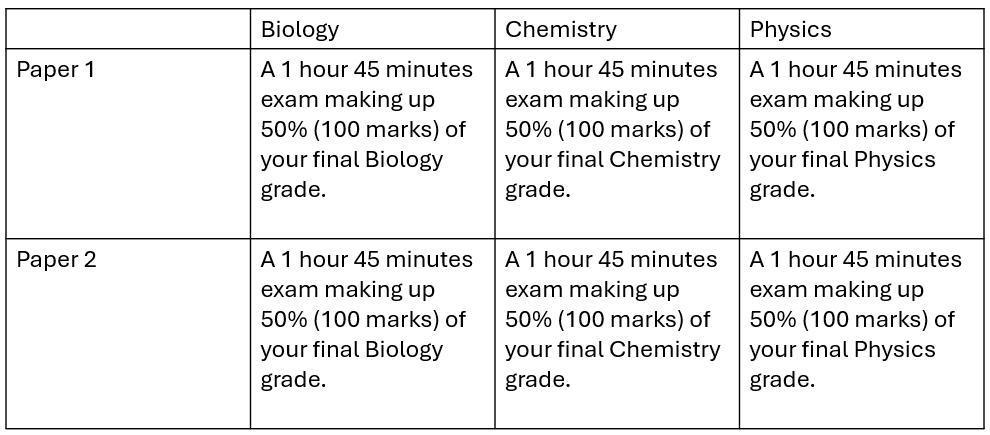
You will cover a range of topics across mathematics, such as:
Cell biology, Bioenergetics, Ecology, Inheritance
Atomic structure, Energy changes, Organic chemistry, Chemical analysis Energy, Electricity, Atom structure, Waves, Space physics
Progression and careers
A Levels as preparation for entry to higher education in a range of subjects. Enter employment, apprenticeships or higher education
Doctor, Vet, Physiotherapist, Chemist, Beautician, Plumber, Nurse, Architect, Surveyor, Engineer, Marine biologist, Electrician
